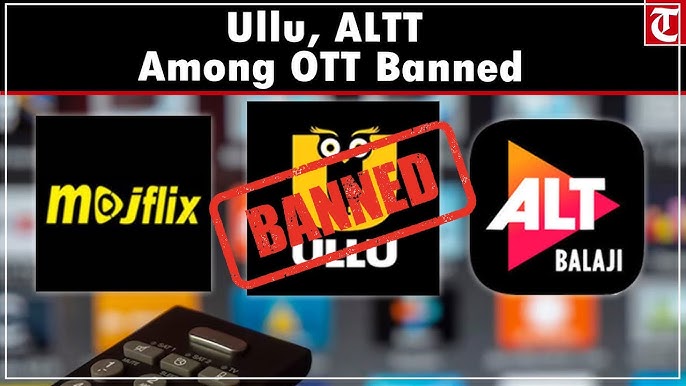On July 25, 2025, the Ministry of Information & Broadcasting (MIB) issued a sweeping order directing Internet Service Providers (ISPs) across India to block 25 OTT platforms and associated apps. Among those banned are ALTBalaji (ALTT), ULLU, Desiflix, Big Shots App, Boomex, MoodX, Mojflix, Navarasa Lite, Gulab App, Hulchul, Mojflix, Triflicks, and others—citing violations of IT and decency laws.
📜 Legal Basis & Government Rationale
The decision relies on multiple legal provisions:
- Sections 67 and 67A of the IT Act 2000, prohibiting publication or transmission of obscene or sexually explicit content in electronic form.
- Section 294 of the Bharatiya Nyaya Sanhita, 2023, related to obscene acts and language in public.
- Section 4 of the Indecent Representation of Women (Prohibition) Act, 1986, banning objectification of women.
MIB’s notification emphasized that these platforms streamed content with no meaningful storyline or social message, primarily aimed at titillation and higher viewership, often accessible without age verification.
📋 Full List of Banned OTT Platforms
According to Livemint and other sources, the banned platforms include:
- ALTBalaji (ALTT)
- ULLU
- Big Shots App
- Desiflix
- Boomex
- NeonX VIP
- Navarasa Lite
- Gulab App
- Kangan App
- Bull App
- ShowHit
- Jalva App
- Wow Entertainment
- Look Entertainment
- Hitprime
- Fugi
- Feneo
- ShowX
- Sol Talkies
- Adda TV
- HotX VIP
- Hulchul App
- MoodX
- Triflicks
- Mojflix
In some cases, the crackdown also extends to associated websites and social media domains.
🔄 Repeated Warnings & Evading Compliance
Officials revealed that MIB and self-regulatory bodies such as the Digital Publisher Content Grievances Council (DPCGC) had issued warnings months ago. ULLU was previously instructed to take down over 100 web series, including the controversial “House Arrest” show, but repeatedly re-uploaded content, sometimes in unedited form.
Attempts to circumvent warnings—like shifting domains or re-uploading edited content—triggered stricter enforcement under IT Rules, 2021. Intermediaries failing to comply could lose immunity under Section 79(1) of the IT Act.
🧠 Stakeholder Reactions & Industry Impact
Ekta Kapoor publicly responded to her platform being implicated. She clarified that she and her mother Shobha Kapoor had stepped down from ownership/management roles at ALTT, distancing themselves from current operations and content issues.
While ALTBalaji was once valued at ₹1,209 crore and seen as a major streaming asset of Balaji Telefilms, the ban is a significant business setback.
The National Commission for Women (NCW) and political groups supported the move, citing the need to protect children and uphold national decency standards. Complaints had been filed by the National Commission for Protection of Child Rights (NCPCR) and civil society advocates earlier in 2024.
⚖️ Legal & Regulatory Implications
This action is pivotal in legal regulation of OTT platforms content in India. The earlier absence of enforceable frameworks allowed platforms to exploit gaps: showing sexual content without narrative justification or proper age checks. Following Supreme Court and High Court calls for regulation, the government is now using IT Rules 2021 and existing obscenity laws to assert control.
This crackdown may usher in stronger statutory structures such as the proposed Content Evaluation Committee (CEC) under the Draft Broadcasting Services Regulation Bill—a hot topic in current legislative debates.
📝 What Law Bloggers & Practitioners Should Note
- Precedent-setting enforcement: This marks one of the broadest bans across streaming platforms—not limited to piracy, but targeting licit streaming with allegedly objectionable content.
- Intermediary liability risks: Platforms, CDN providers, or hosting services failing to self-censor may be held liable and lose safe harbor protection.
- Cross-ministerial involvement: Notifications were issued after consultation involving MIB, Ministry of Electronics & IT, Women & Child Development, and legal experts—illustrating collective governance.
- Self‑regulatory body limitations: The failure of DPCGC to enforce its advisories underscores the need for stronger compliance norms.
✅ Concluding Remarks
India’s ban on 25 OTT platforms—including prominent names like ULLU and ALTT—signals a new regulatory era. Driven by concern over indecent and pornographic content, the government has moved decisively under existing IT laws and decency regulations. This action highlights the balance between creative freedom and public morality, raising important questions on enforcement, platform liability, and legislative reform.
For legal professionals and law bloggers, this marks a vital turning point. India’s digital media landscape is now shifting from self-regulation to statutory accountability—and the rules of the game have changed.
To read more Indian Laws and news, visit Legal Guide India



